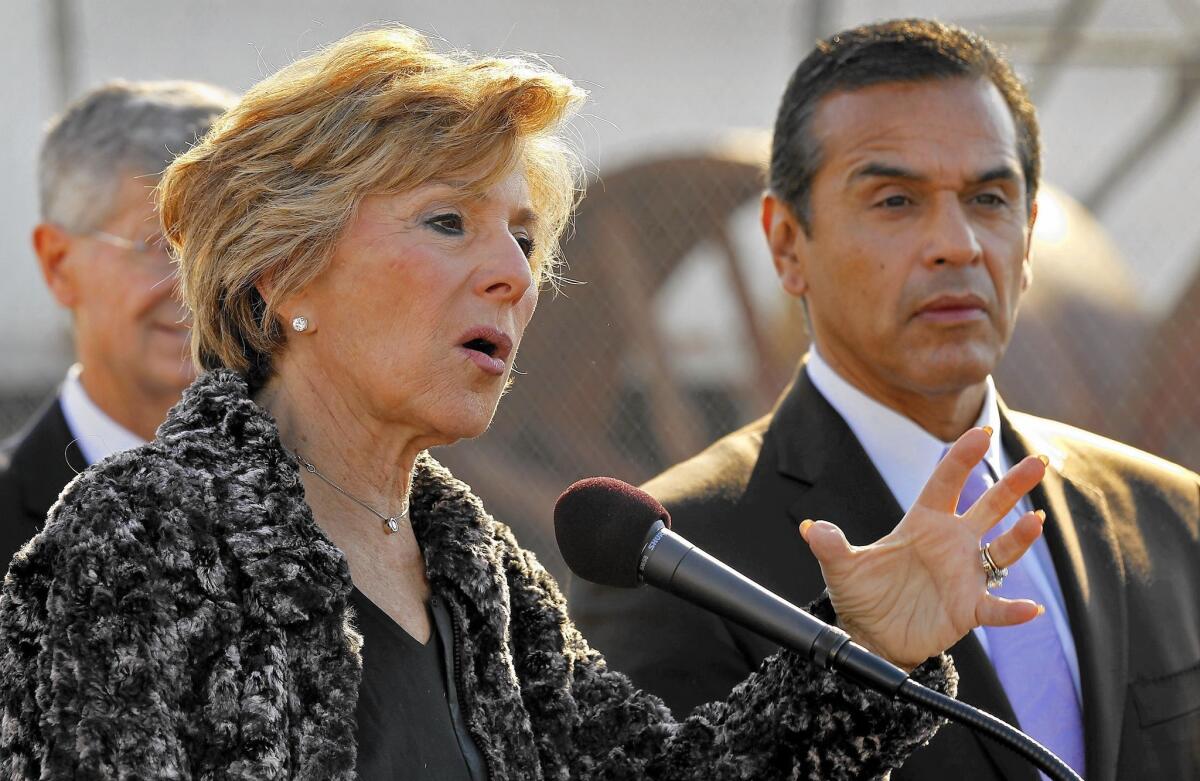Villaraigosa would add dynamic new element in race to succeed Boxer

- Share via
Former Los Angeles Mayor Antonio Villaraigosa’s announcement that he is seriously weighing a bid for the U.S. Senate seat that will be vacated by fellow Democrat Barbara Boxer added a dynamic new element to what is likely to be a crowded and expensive race.
He would be the biggest-name candidate from Los Angeles — the largest media market in the state and home to millions of voters — and the most prominent Latino to run, a demographic advantage that nods to one of the fastest-growing voter groups in the state.
“If he decided to run for senator, he would be very much a tier one candidate on all fronts ... on the policies, his history, his experiences, his name recognition,” said Maria Elena Durazo, vice president of the UNITE HERE union and a powerful labor voice. “A Latino winning the Senate seat from California would be a very powerful message to send.”
But Villaraigosa’s prospects are mixed. He has alienated some key constituencies, lugs personal baggage and would probably face stiff competition from candidates who regard him as a has-been from a previous generation.
Villaraigosa grew increasingly unpopular among his own city’s voters during his tenure as a two-term mayor. And he has suggested repeatedly in recent years that he would prefer to run for governor in 2018.
Even some loyalists appeared stunned by his interest in the Senate, which he announced by releasing a statement over the weekend.
“Too many Californians are struggling to make ends meet, pay the bills and send their kids to college. They are looking for progressive leaders in Washington who will fight for them, like Sen. Boxer has done for over 20 years,” the statement said.
“… It would be an honor to serve Californians again in the future. The urgency of the needs of the people of this great state have convinced me to seriously consider looking at running for California’s open Senate seat,” it said.
Villaraigosa did not respond to requests for an interview. But several analysts said his interest in the race showed shrewd political calculation.
“More than anything else, it’s timing,” said Raphael J. Sonenshein, executive director of the Edmund G. “Pat” Brown Institute of Public Affairs at Cal State L.A.
Current Los Angeles Mayor Eric Garcetti said last week that he would not run for Boxer’s seat, which could make Villaraigosa the strongest candidate from the region. And the election to replace Boxer will be held at the end of 2016; given that Villaraigosa left public office in 2013 and has since largely been out of the public eye in California, the 2018 governor’s race may be too far off.
In addition, the contest to replace the senator occurs concurrently with the next presidential election — typically an event that draws a more diverse, more liberal and younger voter pool and can be expected to attract more Los Angeles-area voters to the polls.
Villaraigosa has clear strengths — he is a charismatic politician with a lengthy resume who has garnered national attention in Democratic circles. He was picked to lead the Democratic National Convention in 2012, a high-profile perch.
But the national visibility comes with drawbacks. As mayor, he was frequently viewed as a self-promoter more focused on his own life and national reputation than on the city’s problems, a narrative he would have to fight if he mounted a Senate bid.
“I have a hard time seeing him being one of 100” senators, said Jaime Regalado, professor emeritus of political science at Cal State L.A.
Though Villaraigosa began his career in labor, he made enemies in that camp while he was mayor, notably by questioning the power of teachers unions. They are a critical group in a Democratic primary with the resources to shape the race — and to go all in to block his effort.
He was also less popular when he left the mayor’s office than when he entered, partly a function of the national economic downturn during his tenure that prompted cutbacks in city services. And although he is better known than many other potential candidates for the Senate post, he also had more unfavorable ratings in an October poll by USC Dornsife and The Times.
Moreover, one of his key strengths — his popularity among minority voters — would be undercut if state Atty. Gen. Kamala Harris or state Treasurer John Chiang mounted a bid.
Harris and Lt. Gov. Gavin Newsom are the most frequently talked about as possible Senate candidates; their candidacies would set up generational and Bay Area-versus-Southern California battles against Villaraigosa. Three little-known Republicans are also pondering whether to run for the seat.
Harris, who lives in San Francisco but has been spending more time in Los Angeles since marrying a lawyer based here last year, held a swearing-in celebration at the City Club in downtown Los Angeles on Sunday. She was been working to become better known in Southern California, where she ran advertisements during her easy reelection bid in the fall.
Her possible Senate run was the buzz among the attendees at Sunday’s gathering, which included former Gov. Gray Davis, Secretary of State Alex Padilla and Los Angeles County Sheriff Jim McDonnell.
Like nearly every other candidate mulling a Senate run, Harris was coy about her intentions when asked by a reporter.
“I am just enjoying this day, thank you,” she said.
Twitter: @LATSeema
Times staff writers Kim Christensen and David Zahniser contributed to this report.
More to Read
Sign up for Essential California
The most important California stories and recommendations in your inbox every morning.
You may occasionally receive promotional content from the Los Angeles Times.











